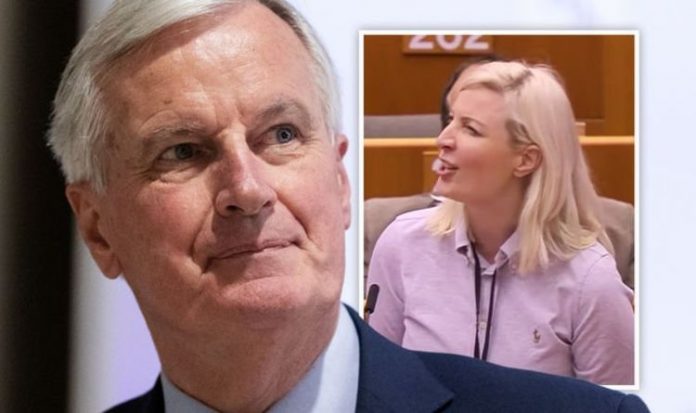Brexit has given the European Union the chance to show member states how hard the bloc can crack down on competition, according to Ms Huhtasaari. The eurosceptic Finnish MEP insisted Brussels is “afraid” of the potential the EU27 could unlock outside the bloc. Speaking to Express.co.uk, she suggested the success of Brexit could mark the start of the collapse of the union.
Ms Huhtasaari said: “The EU is afraid of competition.
“Because it knows that the member states would do better without a federal state, they would do better as independent states with a free trade area.
“If Brexit is a success, it will be the beginning of the end of the EU and that’s why they’re in a hurry.
“They want to make it harder and harder to leave the EU, and that’s why the corona package is being pushed so hard.”
JUST IN: Fury as Irish politicians make outrageous coronavirus blunder
Despite the European Union existing in its various forms for over fifty years, it was not until 2009 that the bloc first introduced a measure for its member states to withdraw from the union.
The UK became the first member state to lodge a request for quitting the EU after the country voted by a majority to quit in June 2016.
After over two years of troubled negotiations on the withdrawal agreement, the UK officially left the EU and entered a transition period due to end on December 31, 2020.
At the end of the seventh round of trade negotiations between the UK and the EU this week, chief negotiator Michel Barnier remarked no progress had been made on the future trade arrangements.
READ MORE: Brexit row erupts between No10 and Scotland as SNP ramps up pressure on fishing talks
UK negotiator David Frost also conceded a deal “will not be easy to achieve” as Brussels continued to insist on Britain following the bloc’s state aid rules past December 31.
Mr Frost said: “He said: “We have just concluded the seventh round of negotiations with the EU. As I said last week, agreement is still possible, and it is still our goal, but it is clear that it will not be easy to achieve.
“Substantive work continues to be necessary across a range of different areas of potential UK-EU future cooperation if we are to deliver it.
“We have had useful discussions this week but there has been little progress.
“The EU is still insisting not only that we must accept continuity with EU state aid and fisheries policy, but also that this must be agreed before any further substantive work can be done in any other area of the negotiation, including on legal texts.
“This makes it unnecessarily difficult to make progress. There are other significant areas which remain to be resolved and, even where there is a broad understanding between negotiators, there is a lot of detail to work through. Time is short for both sides.”







